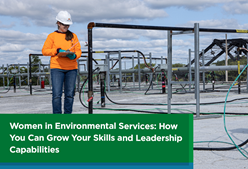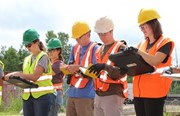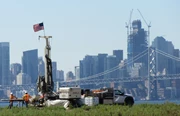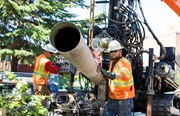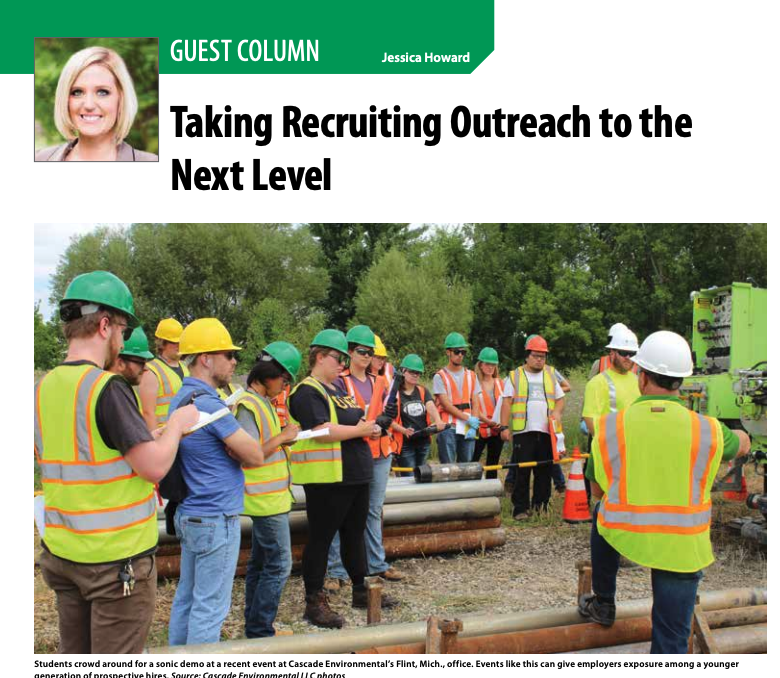Women in Environmental Services: Project Scientist Katelynn Shields
By: Katelynn ShieldsWorking in environmental services offers great pay, career opportunities, and a growing industry—but despite these attractive traits, we don’t see a lot of women in these roles. That is beginning to change, and our quarterly series, Women in Environmental Services, highlights some of the women who are carving out space for themselves and others.
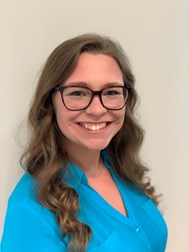 Meet Katelynn Shields
Meet Katelynn Shields
Katelynn Shields is a Project Scientist at Integral Consulting Inc., where she plans and oversees drilling events, evaluates and interprets soil and groundwater data, and compiles information into actionable reports for her clients. Katelynn’s been in environmental services for seven years, and in this post she explains how she ended up in this industry and advice she’d give other women considering a similar career.
What career did you imagine for yourself as a child?
When I was a child, I had dreamed of being a marine biologist. My entire bedroom was full of books on dolphins and other marine mammals, and I had huge plans that I would one day scuba-dive and travel the world to finally meet these animals in person. I haven’t gotten to see those animals in the wild, but these days I do get to occasionally work in water.
What career did you plan to pursue when you began college/training? If different than before, how did that change of mind come about?
By the time I was choosing a career path, my dream had changed, and I started school at Drexel University, majoring in environmental engineering. It seemed like a logical step to my 17-year-old self: I was decent at math and loved being outside. When I started looking into career paths during my freshman year, I realized a majority of environmental engineering job options included working at wastewater treatment plants, and to quote my past self, “I don’t want to spend my life cleaning up other people’s messes.” The joke’s on me, considering I now work in remediation.
I changed majors to environmental science, and I fell in love with geology after landing a work-study position in Drexel’s paleontology lab. Drexel has a co-op program where you complete three 6-month-long internships at environmental laboratories or in other professional locations, including consulting firms, private companies, and city and other government agencies.
What was your first job out of college?
During my third year of school, I landed an internship in environmental consulting, working with the company that would later become my first full-time employer after graduation.
How did you end up in your current role?
I spent a few years working at that firm and then a second one before finding my home at Integral. I am happy that I work with a fantastic group of people under one of the project managers I met during my first consulting internship.
What kind of things do you do in your current role?
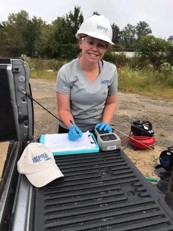 In my current role, I work on remedial investigations in New Jersey and across the country, as well as provide litigation support for properties and areas that have been impacted by environmental contaminants. My job includes planning and overseeing drilling events, evaluating and interpreting soil and groundwater data, and eventually compiling this information into reports to be used by our clients. I still spend time working outside occasionally, and Integral has given me the opportunity to work on some incredible projects investigating emerging contaminants.
In my current role, I work on remedial investigations in New Jersey and across the country, as well as provide litigation support for properties and areas that have been impacted by environmental contaminants. My job includes planning and overseeing drilling events, evaluating and interpreting soil and groundwater data, and eventually compiling this information into reports to be used by our clients. I still spend time working outside occasionally, and Integral has given me the opportunity to work on some incredible projects investigating emerging contaminants.
What is your favorite part of this job? How about the environmental services industry?
My favorite part about my position, and environmental consulting in general, is that you never solve the same problem twice and are always learning.
What degrees/training/certifications were required for your career path?
My degree is a B.S. in Environmental Science, but there are various choices applicable to the environmental consulting industry. I work with engineers, geologists, chemists, and toxicologists who each contribute to Integral’s goal of helping our clients solve environmental problems. The professional certification that I am working towards is Licensed Site Remediation Professional (LSRP), a license specific to New Jersey. However, other common licenses in this field include P.E. (Professional Engineer), P.G. (Professional Geologist), and other state-specific licenses similar to LSRP.
What traits and/or habits have helped make you successful?
Consulting allows you to choose your own focus and have some variety in your specialty, which I’ve always appreciated; however, there are some general traits and habits I’ve found that helped make me successful. Like most careers, it helps to be organized and have passion for what you do, but my best advice to someone just coming into this field is to be a sponge: learn as much as you can, ask for a chance to help out with that cool project, and take on every opportunity thrown your way. You don’t have to be perfect, but as long as you’re motivated and keep trying, you’ll find your niche.
What would you tell other women considering a career in environmental services?
It’s hard sometimes to be the young girl on site trying to lead a field team or direct subcontractors who have been doing this job for 20 years. I’ve always felt that women often feel like they need to prove themselves or worry about speaking up and being wrong. This was definitely the case for me when I was first starting. Early on in my career, one of my many excellent mentors told me to “show up like you’ve been doing this for years, be confident, and walk away to call me if you need help.” That doesn’t sound like groundbreaking advice, but it reinforced an idea that I think all women joining male-dominated fields should know: you deserve to be here.
With time, you will develop more confidence and thicker skin, but until then, I reiterate: you deserve to be here. While you are building up your confidence, remember, you have already spent a lot of time preparing for where you are, and you should be confident in your decision-making and leadership skills. Even still, when you are unsure or need advice, it’s okay to step away, call the project manager, and just be honest that you need a little help.
Building your support is also essential. Talk to others in the industry as much as you can. That can be someone you look up to in the field or consider joining a professional organization to expand your network. I am the co-Secretary of the New Jersey Society of Women Environmental Professionals (NJSWEP), and being a part of that organization has allowed me to meet so many inspirational men and women in the environmental industry, including other consultants, lawyers, government workers, and members who work for laboratories, drilling companies, other vendors, etc. For someone trying to learn about environmental services, these organizations are a great way to find out what area could be a fit for you.
While this career isn’t the scuba-diving adventure that I had previously envisioned as a kid, I love what I do and still feel like I’m able to make an impact in my little corner of the world. Over the last few years, I’ve grown from a scared new field scientist into a more confident professional, and I still have so many more messes to clean.
If you’re a woman interested in an environmental services career, check out the Cascade Careers hub or the Integral Careers page to learn more and to check out current job openings.
You can also email Jessica Alexander, our Director of Talent Acquisition and Chair of the Diverse Workforce Initiative, for insight or next steps.


